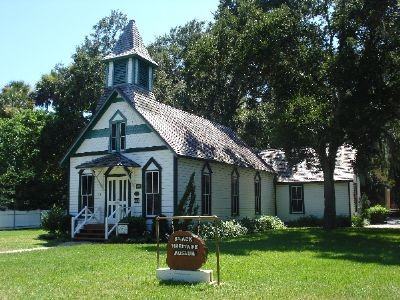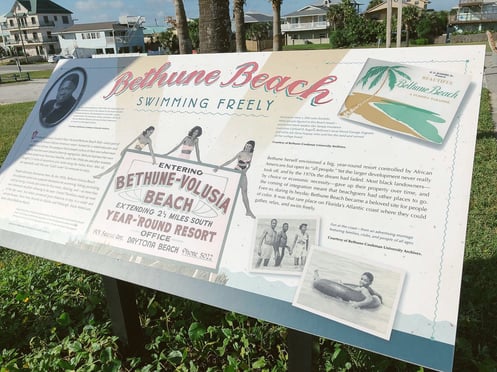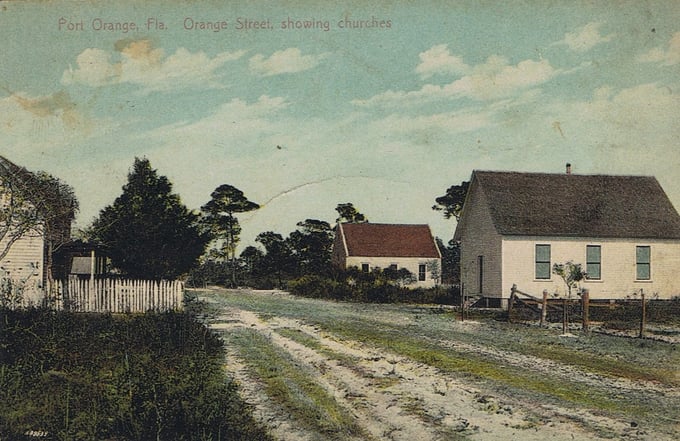Honoring Black History Month in New Smyrna Beach
This February in New Smyrna Beach, make your way around the area’s significant sites representing important moments in Black History. Originally established in the 18th century, NSB has seen generations of notable residents and events that have shaped its storied past and helped to grow the city into its modern prosperity. Celebrate Black History Month by learning more about the indispensable contributions by African American communities throughout the area’s history.
Mary S. Harrell Black Heritage Museum The Mary S. Harrell Black Heritage Museum is housed in a beautifully restored 19th century building that originally served as a place of worship for Black Roman Catholics of the Historic West Side community in New Smyrna Beach. Now, it functions as an exhibit featuring memorabilia and artifacts that educate visitors and residents about 20th century history and race relations in the area. Displays at the Museum showcase achievements and honor hardships of the Black residents, including historic accounts of the Florida East Coast Railroad, Historic West Side, the Underground Railroad, Local Black Cemeteries and more. Through guided tours, oral histories and photos, the Mary S. Harrell Black Heritage Museum preserves integral parts of the community while providing local education and a lasting impact. The museum is located at 314 N. Duss St., New Smyrna Beach, FL 32168 and is open to the public Tuesday through Saturday from 10 a.m. until 1 p.m.
The Mary S. Harrell Black Heritage Museum is housed in a beautifully restored 19th century building that originally served as a place of worship for Black Roman Catholics of the Historic West Side community in New Smyrna Beach. Now, it functions as an exhibit featuring memorabilia and artifacts that educate visitors and residents about 20th century history and race relations in the area. Displays at the Museum showcase achievements and honor hardships of the Black residents, including historic accounts of the Florida East Coast Railroad, Historic West Side, the Underground Railroad, Local Black Cemeteries and more. Through guided tours, oral histories and photos, the Mary S. Harrell Black Heritage Museum preserves integral parts of the community while providing local education and a lasting impact. The museum is located at 314 N. Duss St., New Smyrna Beach, FL 32168 and is open to the public Tuesday through Saturday from 10 a.m. until 1 p.m.
Mary McLeod Bethune Beach Park Celebrated by visitors for its outstanding wildlife watching and beautiful views, Mary McLeod Bethune Beach Park, known to locals as Bethune Beach, was named after a pioneering Black woman and her contributions to the area. Dr. Mary McLeod Bethune fostered a love of education since her childhood, and this passion led her to Florida where she opened the Daytona Normal and Industrial Institute to improve education for the Black community. She went on to bring significant positive changes to other local schools before her achievements were nationally recognized. Ms. Bethune was an advisor to Presidents Calvin Coolidge, Herbert Hoover, Franklin D. Roosevelt and Harry Truman. Later founding the National Council of Negro Women, Bethune’s leadership empowered the Black community in the NSB area and on a national level. Learn more about Dr. Mary McLeod Bethune’s legacy here, and be sure to visit Bethune Beach Park at 6656 S. Atlantic Ave, New Smyrna Beach, FL 32169.
Celebrated by visitors for its outstanding wildlife watching and beautiful views, Mary McLeod Bethune Beach Park, known to locals as Bethune Beach, was named after a pioneering Black woman and her contributions to the area. Dr. Mary McLeod Bethune fostered a love of education since her childhood, and this passion led her to Florida where she opened the Daytona Normal and Industrial Institute to improve education for the Black community. She went on to bring significant positive changes to other local schools before her achievements were nationally recognized. Ms. Bethune was an advisor to Presidents Calvin Coolidge, Herbert Hoover, Franklin D. Roosevelt and Harry Truman. Later founding the National Council of Negro Women, Bethune’s leadership empowered the Black community in the NSB area and on a national level. Learn more about Dr. Mary McLeod Bethune’s legacy here, and be sure to visit Bethune Beach Park at 6656 S. Atlantic Ave, New Smyrna Beach, FL 32169.
Freemanville Settlement
At the heart of Port Orange, learn more about a 19th century African American community known as Freemanville. Founded after the Civil War, the settlement was populated by formerly enslaved people and their families, many of whom had just been reunited after fighting for the Union. Many other Black families then began to move to the area, however, the harsh farming conditions soon proved unfavorable and most of the residents headed elsewhere. The few original families that helped found the settlement still remained, and the enduring community became known as “Freemanville.” The Freemanville church, Mt. Moriah Baptist Church, is the last remaining structure from the original town and still functions as a place of worship for the Black community today. Visit the church and learn more about the Freemanville Settlement, named a Florida Heritage Site, at its location at the intersection of Orange Avenue and Charles Street in Port Orange.
Be sure to add these historic sites to your NSB itinerary to learn more about the Black community’s essential role in shaping the area’s storied past. To learn more about these landmarks and plan your tour of New Smyrna Beach, please visit www.visitnsbfl.com.
